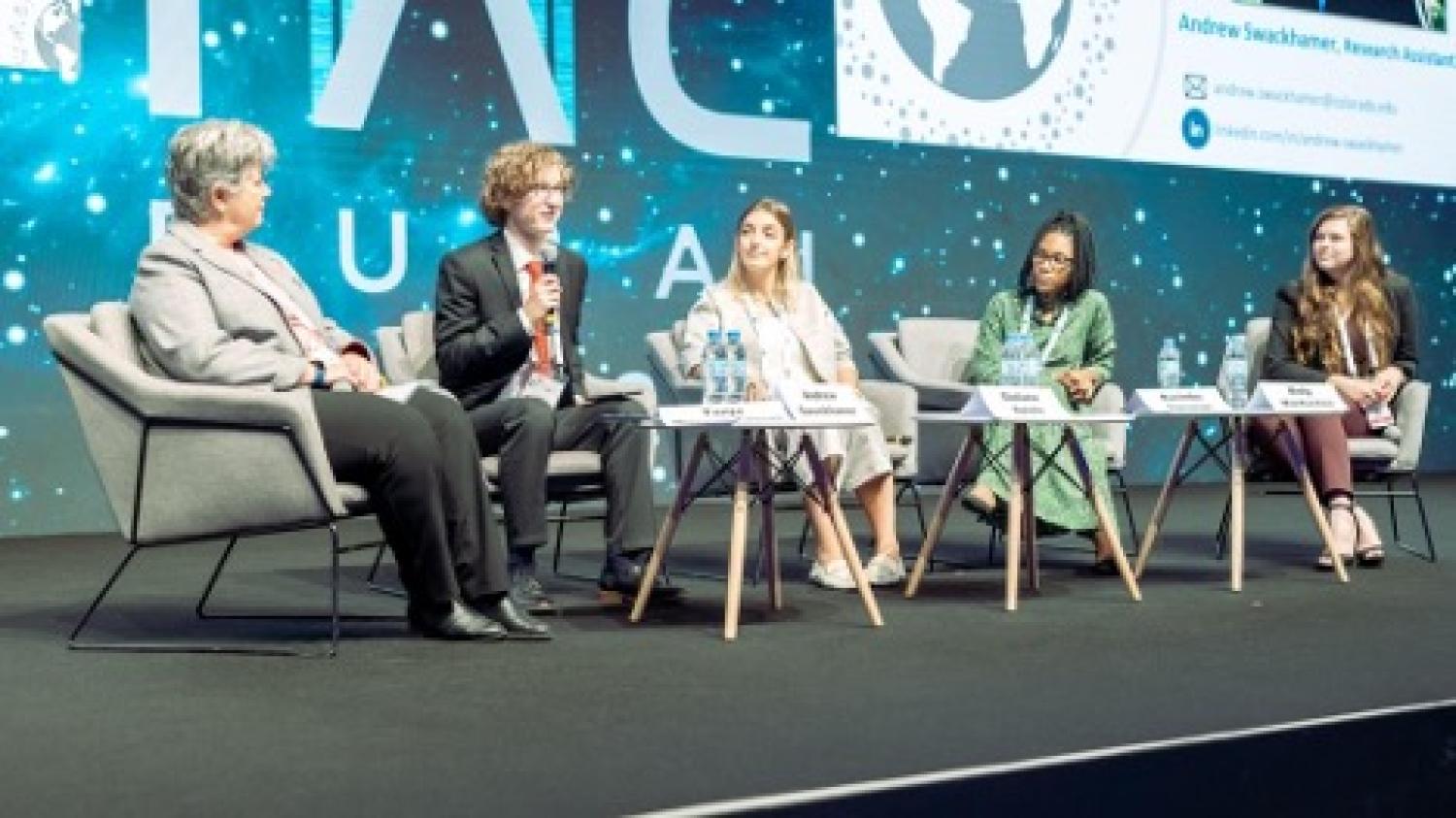Tales from Dubai: Molly’s experiences at the 2021 International Astronautical Conference and the Space Generation Conference

This past fall, RAs Molly MacEachen and Andrew Swackhamer represented the Space & Sustainability Initiative (SSI) as panelists for the Plenary Session, “Social Responsibility in Space: How the Next Generation is Leading the Charge” at the 2021 International Astronautical Congress (IAC) in Dubai. To make this happen, both were awarded grants from the Future Space Leaders Foundation (FSLF) to fund their travel. In addition to participating in IAC, they were also accepted to the Space Generation Congress (occurring the week before IAC), where they participated in working groups related topics on space safety and sustainability.
After their return, Mack Rodgers had a chance to talk to Molly about IAC and the Congress (SGC) and her experiences in both. Below are some excerpts from their email conversation, as well as pictures from Dubai.
How did you hear about this opportunity?
Early in the year 2021, my colleague Andrew forwarded on this call for panelists to be a part of the Next Generation Plenary on Social Responsibility and Sustainability at this year’s IAC. While he encouraged me to sign up, I instead pushed him to apply. We decided to both apply, helping each other in the application process and thinking how cool it would be if one of us were to get it and be able to represent SSI. A month or so later, Andrew and I both got the news that we were selected and could barely believe it.
Once you were chosen, how did you find funding to cover your participation?
After being chosen, it was clear to us both that it was important to secure funding to support our travel. A bit outside of our comfort zone, we both searched for scholarships and grants, talked to people we knew, and finally received the amazing news that we both would be awarded funding from the Future Space Leaders Foundation (FSLF). Bigger than just a sigh of relief knowing that we could attend, this grant provided us a community going into IAC and SGC. Months ahead of the events, we had guidance from the foundation coordinator, connection to all the other recipients in our cohort, and even were able to set up housing arrangements together during the conference. Then when we were there at IAC, we had the pleasure of meeting in person for dinner a few times to better get to know the contacts from the foundation, our fellow recipients, and even former award winners who are now alumni of the program.
“A bit outside of our comfort zone, we both searched for scholarships and grants, talked to people we knew, and finally received the amazing news that we both would be awarded funding from the Future Space Leaders Foundation”
How did you get involved in Space Generation Congress in addition to IAC?
After I was accepted as a speaker for the panel at IAC, and after I received a grant from FSLF, the foundation coordinator from FSLF then encouraged all of us to join the Space Generation Advisory Council (SGAC). The SGAC holds their annual Space Generation Congress (SGC) in conjunction with the IAC, so we were fortunate enough to attend both. What I realized was that SGAC was like the next generation IAC. Anyone under 35 can join, and we dealt with pressing topics that were discussed at IAC, but in our own smaller forums and working groups.
What is something you learned at IAC?
The panel that I spoke on was incredibly informative, and I’m so proud to have shared the stage with three incredible humans who are doing amazing things in the space industry. One of them, though, stood out more than the rest (to me as well as the audience). Her name is Ruvimbo Samanga and she is a space law and policy analyst, award-winning outreach specialist, and Earth Observation entrepreneur from Zimbabwe. Ruvimbo talked about the critical need for involving emerging space nations, and Africa as a whole, in the space industry as it blossoms. She prompted us, “Look around the room. How many Africans do you see? Very few. Space and space events like these need to be more accessible to people who have difficulty to afford to be here, so their voices can be heard.” Ruvimbo also raised the importance of utilizing space technology to improve quality of life here on Earth. She explained that 8 million Zimbabweans are food insecure, and that “Food security and climate change are a ticking time bomb for society in Africa.” What does this have to do with space? Well, it turns out that there are a number of space-based technologies that can contribute to these issues here on Earth. For example, Earth observation by satellites can identify critical trends in soil health and agricultural prosperity.
Why do you think learning about space and sustainability is important?
Without sustainability, the space industry has no future. There are already millions of debris objects in the eEarth’s orbit that pose a threat to operational satellites and human space exploration. And these debris objects are just those large enough to track, ignoring the likely billions of small debris objects (less than 10cm) that we cannot. If we continue to leave satellites in orbit after their useful life, we are congesting the air space that is so critical to missions that can improve life here on eEarth.
"Without sustainability, the space industry has no future"


